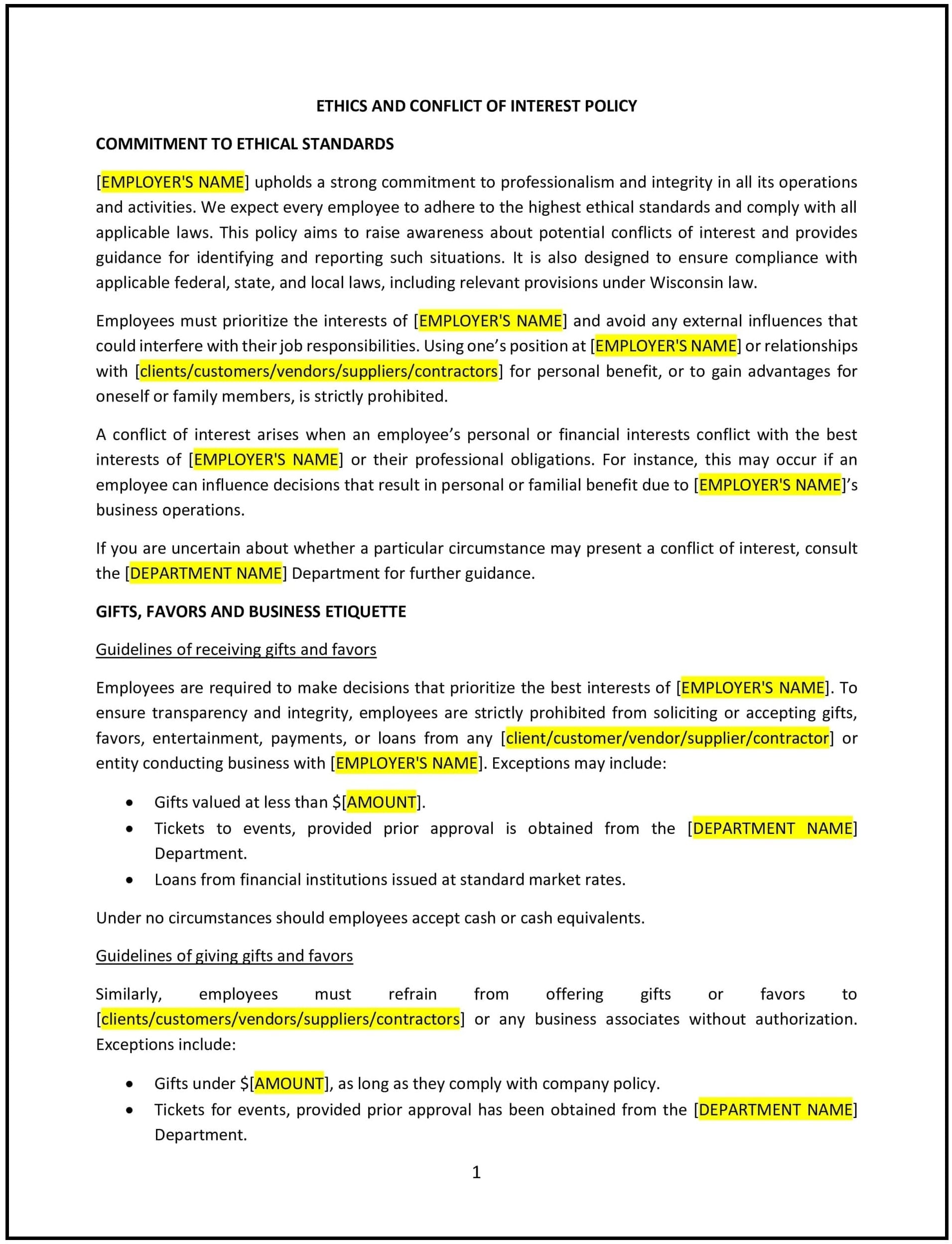Ethics and conflict of interest policy (Wisconsin): Free template
Got contracts to review? While you're here for policies, let Cobrief make contract review effortless—start your free review now.

Customize this template for free
Ethics and conflict of interest policy (Wisconsin)
An ethics and conflict of interest policy helps Wisconsin businesses maintain a high standard of ethical conduct by outlining the company’s expectations regarding integrity, transparency, and avoiding situations where personal interests conflict with business interests. This policy ensures that employees act in the best interest of the company and its stakeholders and discloses any potential conflicts of interest that could affect their judgment or decisions.
By implementing this policy, businesses can safeguard their reputation, foster trust among employees and customers, and improve compliance with legal and ethical standards.
How to use this ethics and conflict of interest policy (Wisconsin)
- Define ethical behavior: Outline the ethical standards expected of all employees, including honesty, integrity, fairness, transparency, and respect for the rights and interests of others. Specify that employees are expected to act in the best interest of the company and its stakeholders at all times.
- Identify potential conflicts of interest: Clearly define what constitutes a conflict of interest, such as situations where an employee’s personal interests (financial, familial, or otherwise) might influence their professional decisions. This could include accepting gifts, investments in competing businesses, or relationships with vendors or clients.
- Disclose conflicts of interest: Establish a procedure for employees to disclose any potential or actual conflicts of interest to HR, compliance officers, or management. Ensure that employees know when and how to report potential conflicts.
- Address acceptable gifts and favors: Specify whether employees are allowed to accept gifts, favors, or other benefits from clients, vendors, or business partners. If allowed, set limits on the value of gifts and outline acceptable circumstances for accepting them.
- Outline consequences for non-disclosure or unethical behavior: Specify the actions that will be taken if an employee fails to disclose a conflict of interest or engages in unethical behavior. This may include disciplinary action, counseling, or termination.
- Address external activities: Clarify the company’s position on employees engaging in external business activities, such as running a side business or holding positions with other organizations, especially if these activities might create a conflict with their work duties.
- Promote transparency: Encourage open communication regarding conflicts of interest, ensuring that employees feel comfortable discussing any potential issues without fear of retaliation.
- Maintain confidentiality: Ensure that any information related to conflicts of interest or ethical violations is kept confidential and shared only with the relevant parties involved in the resolution process.
Benefits of using this ethics and conflict of interest policy (Wisconsin)
This policy offers several benefits for Wisconsin businesses:
- Protects the company’s reputation: By ensuring that employees act ethically and avoid conflicts of interest, the policy helps maintain the company’s reputation for integrity and trustworthiness.
- Enhances transparency: The policy promotes transparency in business practices, ensuring that decisions are made based on merit and the best interests of the company, not personal gain.
- Reduces legal and financial risks: By preventing unethical behavior and conflicts of interest, the policy helps mitigate the risk of legal disputes, fines, or financial penalties related to improper conduct or decision-making.
- Encourages employee accountability: Employees who understand the importance of ethical behavior and disclosure of conflicts are more likely to act responsibly and in line with company values.
- Fosters a positive work environment: A clear code of ethics creates an environment where employees feel confident that decisions are made fairly and in accordance with the company’s values, leading to higher morale and trust in leadership.
Tips for using this ethics and conflict of interest policy (Wisconsin)
- Communicate the policy clearly: Ensure that all employees are aware of the ethics and conflict of interest policy and understand their responsibilities under it. Provide regular training and reminders to reinforce its importance.
- Encourage reporting: Create a safe environment for employees to report conflicts of interest or unethical behavior. Offer multiple ways to report, including anonymous options if necessary.
- Regularly review the policy: Periodically review the policy to ensure it remains relevant and effective. Update the policy as needed to reflect changes in laws, regulations, or company practices.
- Lead by example: Company leaders should model ethical behavior and transparency, setting an example for employees to follow.
- Maintain clear records: Keep detailed records of any disclosed conflicts of interest and the steps taken to address them. This ensures that the company has a clear history of ethical decision-making.